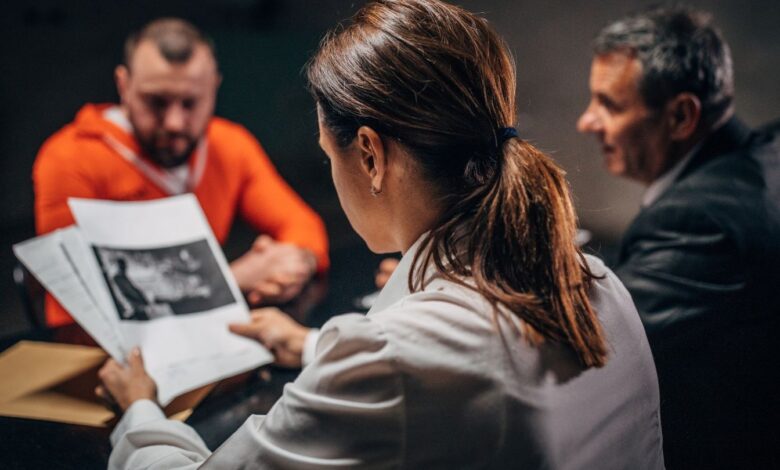Top Defence Strategies Criminal Lawyers Use To Win Cases
To defend their clients, criminal defence attorneys combine strategic thinking, legal expertise, and investigative prowess.

The experience of a qualified attorney can make all the difference when one is facing criminal accusations. To contest the prosecution’s case and defend their clients’ rights, criminal defence lawyers employ a range of tactics. Their objective is not only to prove innocence but also to generate reasonable doubt, undermine the case of the prosecution, and guarantee the best possible result. Some of the most successful defence techniques criminal attorneys employ to win cases are discussed here.
Challenging The Evidence
The evidence the prosecution presents is among the most important features of any criminal case. Criminal lawyers frequently examine the methods of evidence collecting, handling, and presentation. Should any phase of the process deviate from accepted legal practices, the attorney could be able to have the evidence thrown aside.
Any evidence gathered during an illegal search and seizure, for instance, could be declared inadmissible in court if law enforcement personnel carried out such activity without a valid warrant. Likewise, should the chain of custody for evidence be compromised—that is, if there are holes in how it was handled or kept—the defence could contend that evidence has been altered or is untrustworthy.
Defence lawyers also contest evidence by casting doubt on its validity. Should a witness statement vary over time or contradict itself, the defence can contend that the testimony is unreliable. Forensic evidence also has to be correctly examined. Should testing techniques prove to be flawed, the defence might contest the validity of the findings.
Exposing Weaknesses In The Prosecution’s Case
Criminal cases involve the burden of proof primarily falling on the prosecution. This means they must prove beyond a reasonable doubt that their client is guilty; to create reasonable doubt in this process, an effective defence attorney seeks to demonstrate weaknesses or contradictions in the prosecution’s case.
Defence attorneys might raise this flaw if, for instance, the prosecution relies mainly on circumstantial evidence as opposed to direct proof. Furthermore, an attorney could call attention to these discrepancies to challenge its validity; perhaps there are competing theories for what caused the crime, or witnesses from both sides present conflicting stories during trials.
Another popular strategy employed by defence teams is discrediting key witnesses. If any key witnesses possess criminal backgrounds, histories of dishonesty or personal incentives to lie, defence teams might employ these facts against them in an effort to discredit their testimony and disprove it altogether.
Establishing An Alibi
An alibi defence demonstrates that the defendant was not there when the crime took place and when solid proof supporting the alibi—such as camera footage, phone records, receipts, or witness comments verifying the defendant’s location—this approach is most successful.
Working to compile and present this information in a manner that unequivocally shows their client could not have committed the crime, criminal lawyers aim to When the prosecution’s evidence is mostly circumstantial, a well-documented alibi can seriously undermine their case.
Self-Defence And Justification
Sometimes, a defendant will admit to having committed an act yet contend that it was legally justifiable. The common legal tactic used in cases involving serious crimes like assault or homicide is self-defence. A defence attorney has to show that the defendant acted to guard someone else or themselves against immediate injury.
Lawyers have to show that there were no reasonable alternatives, that the use of force was required, and that it was commensurate with the threat in order to create a solid self-defence claim. Medical records, witness accounts, and security footage support this case.
Other defences include duress—where the defendant committed a crime under danger of harm—protection of others, defence of property, and the crime itself.
Mistaken Identity And False Accusations
Many criminal cases include incorrect identification in a major part. Misidentification by a witness, mistakes in police investigations, or false evidence could all cause someone to be falsely accused. By offering alternate explanations, contesting eyewitness testimony, and bringing evidence supporting their client’s innocence, defence lawyers seek to show that their client was not involved in the crime.
False allegations can arise from personal grudges, erroneous ideas, or even legal compulsion by law enforcement. Examining the reasons behind an accusation, a defence attorney will look for discrepancies in claims and motives that would suggest the allegation is untrue.
Plea Bargaining And Negotiation
Not every matter goes before trial. Sometimes, defence attorneys bargain with the prosecution for a plea agreement, in which case a guilty plea could result in lower charges or shorter sentences. Although this might not provide a complete acquittal, it can be a calculated approach to get the best possible result for the defendant.
When the prosecution has solid evidence but is ready to compromise to save the time and money of a protracted trial, plea bargains are sometimes used. A competent defence attorney will evaluate whether their client would benefit from a plea agreement or if they have a strong enough case to challenge the accusations before the courts.
Conclusion
To defend their clients, criminal defence attorneys combine strategic thinking, legal expertise, and investigative prowess. They seek the best possible conclusion by contesting the evidence, pointing flaws in the prosecution’s case, proving alibis, claiming self-defence, and haggling over plea offers. Hiring a competent attorney can make all the difference in guaranteeing a fair trial and safeguarding rights for anyone facing criminal accusations.











